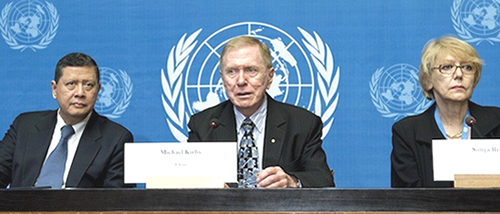
Credit: UN
The curtain of secrecy enshrouding one of the world’s most isolationist States, North Korea, is being partially lifted this week through the testimony of more than 30 witnesses, including several who have fled the country, at public hearings held by the United Nations Commission of Inquiry on Human Rights in the Democratic People’s Republic of Korea. Yesterday, survivors of North Korean prison camps, including Shin Dong-hyuk, told the UN body of the horrors they experienced and witnessed, including starvation, beatings and public executions. [Reuters; New York Times]
The public sessions are intended to help raise awareness and visibility of the human rights conditions in North Korea and will be particularly important to the Commission’s investigation in light of the State’s failure to authorize a fact-finding visit within its borders. The hearings will focus on allegations of systematic, grave and widespread violations of human rights, and are being held from August 20 to 24 in Seoul, South Korea. [OHCHR]
The creation of the Commission itself is the product of efforts by the Special Rapporteur on the situation of human rights in the Democratic People’s Republic of Korea, the International Coalition to Stop Crimes against Humanity in North Korea, and non-governmental organizations to address North Korea’s human rights violations. During its 22nd Session, the United Nations Human Rights Council established a three-member Commission of Inquiry to carry out a year-long in-depth investigation of alleged violations of the right to food, torture and inhumane treatment, freedom of expression, violations in prison camps, and enforced disappearances of dissidents and foreign nationals, among other abuses. The Commission’s “Questions and Answers” document provides other details of its formation and mandate. For additional information on the human rights situation in North Korea, see the Special Rapporteur’s most recent report and this previous IJRC news post.
The Commission’s investigation will provide a basis for holding the North Korean government accountable for any human rights violations, possibly including through the prosecution of State officials in the International Criminal Court for crimes against humanity. [HRW; OHCHR] The Special Rapporteur, Marzuki Darusman, believed that increased international scrutiny, “affords a measure of protection [to human rights victims], especially when coupled with the prospect of future criminal investigations and the deterrent effect such a prospect may have on individual perpetrators.” Report of Special Rapporteur on the situation of human rights in the Democratic People’s Republic of Korea, para. 30
The hearings constitute one of the many critical elements of the Commission’s investigation. Pursuant to its mandate, the Commission is systematically collecting and assessing victim interviews and testimony, as well as accounts by survivors and perpetrators of human rights violations. Previous attempts to obtain this information have been frustrated. There is a “varying amount of documentation . . . available on each of these violations, as information is difficult to obtain, due to the absence of independent monitors and media in [North Korea], the restrictions on citizens leaving the country, and the refusal of the Government of the Democratic People’s Republic of Korea to provide access or otherwise cooperate with the United Nations human rights mechanisms.” Report of Special Rapporteur on the situation of human rights in the Democratic People’s Republic of Korea, para. 7. Eye-witness testimony from former North Korea residents at the scheduled hearings is thus significant since it provides first-hand evidence of violations, but also because “[c]oncerns about reprisals, including against family members who remain in the country, [have generally made] it difficult for individual victims to come forward or agree to the publication of certain details.” Id. The public hearings are guided by principles of transparency, while also providing victims with a comfortable forum to relate their experiences. Requests for North Korea’s attendance at the public hearing have gone unanswered. [OHCHR]
A similar round of public hearings is scheduled to take place in Tokyo, Japan later this month. [UN News Centre] In addition to holding public hearings, the Commission will hold meetings with non-government organizations and research institutions. [UN News Centre] It has also invited individuals, groups, and other organizations to submit information and documentation on the human rights situation in North Korea. Videos of the Commission’s hearings, media reports, and public updates will be provided on the Commission’s website.
The Commission is required to submit its final report of recommendations to the Human Rights Council in March 2014. [OHCHR]
